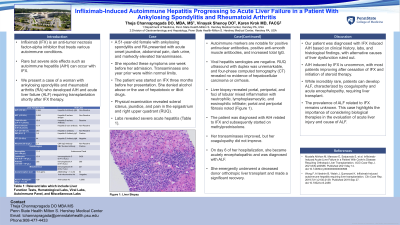Monday Poster Session
Category: Liver
P3007 - Infliximab-Induced Autoimmune Hepatitis Progressing to Acute Liver Failure in a Patient With Ankylosing Spondylitis and Rheumatoid Arthritis
Monday, October 28, 2024
10:30 AM - 4:00 PM ET
Location: Exhibit Hall E

Has Audio

Theja Channapragada, DO, MBA, MS
Penn State Health Milton S. Hershey Medical Center
Springfield, NJ
Presenting Author(s)
Theja Channapragada, DO, MBA, MS1, Vinayak Shenoy, DO2, Karen Krok, MD, FACG2
1Penn State Health Milton S. Hershey Medical Center, Springfield, NJ; 2Penn State Health Milton S. Hershey Medical Center, Hershey, PA
Introduction: Infliximab (IFX) is an anti-tumor necrosis factor-alpha inhibitor that treats various autoimmune conditions. Rare but severe side effects such as autoimmune hepatitis (AIH) can occur with IFX. We present a case of a woman with ankylosing spondylitis and rheumatoid arthritis (RA) who developed AIH and acute liver failure (ALF) requiring transplantation shortly after IFX therapy.
Case Description/Methods: A 51-year-old female with ankylosing spondylitis and RA presented with acute onset jaundice, abdominal pain, dark urine, and markedly elevated transaminases. She reported these symptoms one week before her admission. Transaminases one year prior were within normal limits. The patient was started on IFX three months before her presentation. She denied alcohol abuse or the use of hepatotoxic or illicit drugs. Physical examination revealed scleral icterus, jaundice, and pain in the epigastrium and right upper quadrant (RUQ). Labs revealed severe acute hepatitis (Table 1).
Autoimmune markers are notable for positive antinuclear antibodies, positive anti-smooth muscle antibodies, and increased total IgG.Viral hepatitis serologies are negative. RUQ ultrasound with duplex was unremarkable, and four-phase computed tomography (CT) revealed no evidence of hepatocellular carcinoma or cirrhosis. Liver biopsy revealed portal, periportal, and foci of lobular mixed inflammation with neutrophilic, lymphoplasmacytic, and eosinophilic infiltrate; portal and periportal fibrosis noted. The patient was diagnosed with AIH related to IFX and subsequently started on methylprednisolone. Her transaminases improved, but her coagulopathy did not improve. On day 6 of her hospitalization, she became acutely encephalopathic and was diagnosed with ALF. She emergently underwent a deceased donor orthotropic liver transplant and made a significant recovery.
Discussion: Our patient was diagnosed with IFX induced AIH based on clinical history, labs, and histological findings, with alternative causes of liver dysfunction ruled out. AIH induced by IFX is uncommon, with most patients improving after cessation of IFX and initiation of steroid therapy. While incredibly rare, patients can develop ALF, characterized by coagulopathy and acute encephalopathy, requiring liver transplant. The prevalence of ALF related to IFX remains unknown. This case highlights the importance of considering biological therapies in the evaluation of acute liver injury and cause of ALF. Moreover, transaminases should be closely monitored during treatment.
Note: The table for this abstract can be viewed in the ePoster Gallery section of the ACG 2024 ePoster Site or in The American Journal of Gastroenterology's abstract supplement issue, both of which will be available starting October 27, 2024.
Disclosures:
Theja Channapragada, DO, MBA, MS1, Vinayak Shenoy, DO2, Karen Krok, MD, FACG2. P3007 - Infliximab-Induced Autoimmune Hepatitis Progressing to Acute Liver Failure in a Patient With Ankylosing Spondylitis and Rheumatoid Arthritis, ACG 2024 Annual Scientific Meeting Abstracts. Philadelphia, PA: American College of Gastroenterology.
1Penn State Health Milton S. Hershey Medical Center, Springfield, NJ; 2Penn State Health Milton S. Hershey Medical Center, Hershey, PA
Introduction: Infliximab (IFX) is an anti-tumor necrosis factor-alpha inhibitor that treats various autoimmune conditions. Rare but severe side effects such as autoimmune hepatitis (AIH) can occur with IFX. We present a case of a woman with ankylosing spondylitis and rheumatoid arthritis (RA) who developed AIH and acute liver failure (ALF) requiring transplantation shortly after IFX therapy.
Case Description/Methods: A 51-year-old female with ankylosing spondylitis and RA presented with acute onset jaundice, abdominal pain, dark urine, and markedly elevated transaminases. She reported these symptoms one week before her admission. Transaminases one year prior were within normal limits. The patient was started on IFX three months before her presentation. She denied alcohol abuse or the use of hepatotoxic or illicit drugs. Physical examination revealed scleral icterus, jaundice, and pain in the epigastrium and right upper quadrant (RUQ). Labs revealed severe acute hepatitis (Table 1).
Autoimmune markers are notable for positive antinuclear antibodies, positive anti-smooth muscle antibodies, and increased total IgG.Viral hepatitis serologies are negative. RUQ ultrasound with duplex was unremarkable, and four-phase computed tomography (CT) revealed no evidence of hepatocellular carcinoma or cirrhosis. Liver biopsy revealed portal, periportal, and foci of lobular mixed inflammation with neutrophilic, lymphoplasmacytic, and eosinophilic infiltrate; portal and periportal fibrosis noted. The patient was diagnosed with AIH related to IFX and subsequently started on methylprednisolone. Her transaminases improved, but her coagulopathy did not improve. On day 6 of her hospitalization, she became acutely encephalopathic and was diagnosed with ALF. She emergently underwent a deceased donor orthotropic liver transplant and made a significant recovery.
Discussion: Our patient was diagnosed with IFX induced AIH based on clinical history, labs, and histological findings, with alternative causes of liver dysfunction ruled out. AIH induced by IFX is uncommon, with most patients improving after cessation of IFX and initiation of steroid therapy. While incredibly rare, patients can develop ALF, characterized by coagulopathy and acute encephalopathy, requiring liver transplant. The prevalence of ALF related to IFX remains unknown. This case highlights the importance of considering biological therapies in the evaluation of acute liver injury and cause of ALF. Moreover, transaminases should be closely monitored during treatment.
Note: The table for this abstract can be viewed in the ePoster Gallery section of the ACG 2024 ePoster Site or in The American Journal of Gastroenterology's abstract supplement issue, both of which will be available starting October 27, 2024.
Disclosures:
Theja Channapragada indicated no relevant financial relationships.
Vinayak Shenoy indicated no relevant financial relationships.
Karen Krok indicated no relevant financial relationships.
Theja Channapragada, DO, MBA, MS1, Vinayak Shenoy, DO2, Karen Krok, MD, FACG2. P3007 - Infliximab-Induced Autoimmune Hepatitis Progressing to Acute Liver Failure in a Patient With Ankylosing Spondylitis and Rheumatoid Arthritis, ACG 2024 Annual Scientific Meeting Abstracts. Philadelphia, PA: American College of Gastroenterology.
